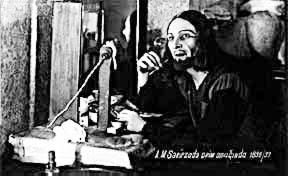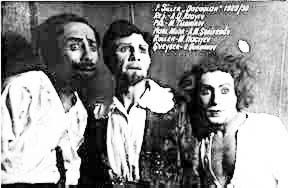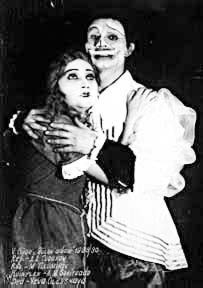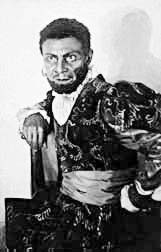|
Spring 1998 (6.1) Reviving the
Memory of Silenced Voices by Azad Sharifov
Abbas Mirza Sharifzade was a popular actor known for his portrayal of Shakespearean characters on the Azeri stage. In 1937, he became one of the first artists to be arrested by the Soviet regime for supposed "counter-revolutionary activities." He was executed the following year, after being forced to write and sign a false confession. His innocence was proven in 1955, and the memory of his talent and love for the theater is being preserved. During the Soviet period, it seemed as if the name of the great Azerbaijani actor Abbas Mirza Sharifzade had been forgotten. Nothing was written about him, his Jubilees were not celebrated. He wasn't even talked about publicly - to do so, would have been risky, perhaps even life threatening during Stalin's regime. Nevertheless, he was loved and remembered, and his talent was greatly admired. For those who had the chance to see his exquisite performances of Hamlet, Macbeth, Sheikhsanan, Elkhan and Dubrovsky, he was unforgettable. Having been born into a family that was thoroughly steeped in the theater, I knew Abbas Mirza Sharifzade from my childhood and saw him perform on stage many times. My parents were close friends, even though they weren't relatives, as many people thought. However, just having been friends with him was enough to create problems and obstacles later on in our lives. It is no coincidence that our family saved some of the photographs of Abbas Mirza Sharifzade. They did this even knowing that just being in possession of such photos put them at risk. My mother used to tell me stories about the great actor. Now, having had the chance to examine Sharifzade's case in the KGB files, I've caught a glimpse of the past, and many things have become clearer.
Photo: Sharifzade in Victor Hugo's "Gulan Adam" in 1929. In fact, until recently, cases were made available to the public very slowly and grudgingly. These days, there is an inclination to write about the forgotten and unknown parts of our history - its "blank pages." Our goal is to revive the memories of those who were the innocent victims of Stalin's policies and make them part of the legacy to future generations. Final Performance Even those who knew him well were amazed at the actor's charm during his scenes, as well as his ability to make his characters become so believable. It seemed as if he underwent a metamorphosis during his scenes. He possessed great versatility and intuition, and when using these gifts during a performance, he was incomparable. When the performance was over, the audience applauded heartily, and Sharifzade returned to the stage again and again. According to eyewitnesses, however, that particular night he seemed unusually sad. They said that as he approached the footlights, he seemed to make a gesture with his hands while bowing, as if trying to embrace his audience. Was he aware of something that his audience did not know? Everything about the theater world was strained during those years. Everybody seemed to be anticipating a disaster. There were none of the usual congratulations about what a good show it had been, nor were there any jokes. After performances, actors no longer used to hang out or to discuss art. Playwright Husein Javid and actor Ulvi Rajab had already been arrested earlier. And who would have thought that in July of that year, after a night of torture, an unidentified Azerbaijan Party member and statesman would, through bloodied lips, whisper the names of his so-called "accomplices," and state that certain men had supposedly "recruited for the counter-revolutionary overthrow of communist power?" The list of names included Abbas Mirza Sharifzade, as well as writers and critics like Salman Mumtaz, Khanafi Zeynali and others. Each day, actors would read in horror that their colleagues had lost their jobs. It was a bad sign. Today, their friends had been fired; they worried about tomorrow.
Photo: Sharifzade playing Shadespeare's "Othello." Sharifzade got into the car and was taken to the notorious house by the sea-the People's Commissariat of Internal Affairs (KGB). "Abbas was taken away!" the costume designer shouted in horror as she ran into the courtyard. Meanwhile, a general search was taking place at the actor's apartment on 115 Chadrovaya Street (known today as Mirza Aga Aliyev Street). Books, plays, wigs, costumes, announcements and theater reviews were all confiscated. Everything was thrown into bags, including notes written in Arabic - notes that would later be entered into Sharifzade's case as "evidence" of criminal relations between the actor and the Iranian Secret Service. Sharifzade would later be accused of receiving assignments from the Iranian Secret Service via a newsstand worker from whom Sharifzade used to buy his newspapers. (It turned out that the newsstand worker was really a provocateur). In reality, the notes were Sharifzade's plays, written in Arabic - nothing unusual given that nearly all Azeris were still familiar with the old Arabic alphabet [The Latin alphabet was officially introduced only in 1928 and would be changed to Cyrillic in 1938]. "I'm going." These words became Sharifzade's words of farewell. They were the words his colleagues would repeat over and over again, recalling his tragic departure. Those who were in the courtyard that horrible night regretted that they had not fathomed the importance of his words. And after those words were spoken, no one-not his family, not relatives or friends-ever heard from him again. He just disappeared, not to return for several decades later - this time as a legend. Inquisition "Do you find yourself guilty?" one of the statements in Sharifzade's case file reads. The questioning took place in January of 1938, approximately one month after his arrest. "No, I don't," Sharifzade replied. "But, you were a member of the Musavat Party during its dominant period in Azerbaijan." "No, I never was a member of the Musavat Party, and I don't agree with the positions of that party." "The investigation offers you a chance to tell the truth about your political affiliations." The investigator charged, "You knew about the anti-Soviet activities of Husein Javid and other nationalist writers. You knew and continued to propagandize their works and to promote their pan-Turkish beliefs. Your repertoire is mostly made up of their works." "I can't say anything bad about these writers," Sharifzade replied. "Their works served, first of all, the interests of the Azerbaijan nation. And my contribution as an actor was to play the roles assigned to me as best I could." "How do you know Ruhulla Akhundov?" "I have no relations with this man. Once, I remember he congratulated me by saying 'Good performance' after Macbeth." "This investigation demands your sincere confession," his interrogators continued. "I have nothing to confess." Hardly a Threat Once, before the Revolution, Sharifzade was arrested and thrown into jail for 10 days due to a conflict with the police over this matter. He tried to do everything in his power to better the lives of workers, to enlighten his nation and to introduce people to Russian works as well as world literature. The heroes he characterized in his performances helped people to carry on, to struggle against old barriers and to overcome religious zealotry. Sharifzade was among those who supported the complete liberation of Azeri women. He did everything he could to attract women to the arts. He resolutely opposed anything that created obstacles for their entry into the art world and opposed any humiliation against the dignity of women. He produced plays for the army and attracted men as future Red Army recruits by asking them to participate in amateur performances. Yet, later he would be questioned about his friends and his works and would have to defend himself by declaring, "I have never done anything against Soviet power." Today we're discovering the truth about those indicted "Enemies of the Nation," and about the methods used to obtain confessions for crimes they never committed. Such sworn confessions reveal themselves to be the results of illegal actions taken by so-called "protectors of the law." While studying Sharifzade's case, I came across the names of some of the investigators who participated in his investigation: Borisov, Mustafayov, Perelman, Abdullayov, Cinder and others. How did these murderers live for so many years, avoiding well-deserved punishment? Their guilt was partially uncovered only when the process of reinstatement for the 1937-38 victims began. For example, during the process of reinstatement, it was revealed that investigators Perelman and Shneider (both of whom were later arrested and convicted) confessed their participation in obtaining confessions from the arrested actor. Sharifzade's case file reveals the absence of any legal protocol whatsoever. A Forced Confession Already weakened and psychologically broken from long hours of torture, Sharifzade was forced to write and sign his admission of guilt "in all committed crimes." The investigators promised him that his written confession would increase his chance for life imprisonment in lieu of the death penalty. They promised that these signed confessions would help in court, but what court? There was no trial! Sharifzade was executed November 16, 1938. A gunshot rang out from the basement of the People's Commissariat and the People's Actor of Azerbaijan Republic, the Shakespearean performer of the Azerbaijani stage, Abbas Mirza Sharifzade, was gone. Reinstatement Over 40 years have passed since Sharifzade's good name was formally restored. And for all these years, his family, friends and admirers have been deprived of an opportunity to honor his spirit. Nobody knows where he was buried, or if he was buried at all. Millions of other families were denied their own farewells - all victims of Stalin's repression. We now know the truth, at least
a small part of it, about the lives of our fathers and grandfathers.
And as we, their children and grandchildren, continue to discover
the truth, our debt to them becomes greater. We feel the need
to bow before their memories. We feel the need to honor their
tragic fates. They deserve our remembrance. |




